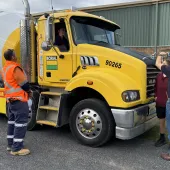Cycle Safe Activity Steps Up

MPA launches Vulnerable Road User Safety Policy
On Wednesday 31 October 2012, the Mineral Products Association (MPA) launched its new Vulnerable Road User Safety Policy at a national Cycle Safe event with the All Party Parliamentary Cycling Group at Wellington Arch, Hyde Park Corner, London, followed by a meeting in the House of Commons with the Transport Minister, Stephen Hammond MP, members of the All Party Parliamentary Cycling Group, representatives from MPA member companies, and cycling and transport groups. The Policy and national Cycle Safe event both form part of MPA’s Cycle Safe campaign and 6-Point Action Plan, which was launched in June 2011 to prevent collisions between cyclists and large goods vehicles (LGVs).
The MPA’s position is that there is joint responsibility for road safety. National and central government must ensure that roads and junctions are designed for safety and properly maintained, LGV operators and drivers must take action to minimize the risk of collisions, and cyclists and other vulnerable road users must behave responsibly. The background to the Policy is the continuing growth in the number of cyclists, particularly in urban areas, and consequently the increased risks of collisions between cyclists and motor vehicles, including lorries.
Two significant points from the 6-Point Action Plan are: to improve driver training; and to encourage members to use appropriate technological adaptations to minimize risks to cyclists and exchange experiences. The new MPA Policy takes these two actions forward. It is designed to ensure that the mineral products industry supports drivers in delivering materials safely and applies to all (in-scope) vehicles delivering on behalf of MPA members (currently tippers, truckmixers, cement tankers). A key principle is that industry drivers are professional and experienced, and it introduces steps which will help drivers to avoid collisions.
The Policy is composed of three key elements:
- All industry drivers must receive vulnerable road-user training. The industry training body has developed a specific course which has now been CPC approved and will be available shortly.
- New industry LGVs must be fitted with additional safety equipment, including blind-spot elimination devices, side under-run guards, class VI mirrors, audible left-turn warnings for cyclists and pedestrians, and rear warning signs.
- Existing industry LGVs must be fitted with similar equipment levels within an extended five-year period, with operators encouraged to consider accelerating this timing.
Training
The Policy sets out that all drivers delivering on behalf of members must hold MPQC Driver Skills Cards or equivalents (eg company courses approved by MPQC), with renewal within five years. In addition, it requires all drivers to undertake specific vulnerable road-user training, based on the MPQC training course which is now JAUPT approved for CPC purposes, in accordance with the following timings: directly employed drivers by December 2013; regular drivers (delivering on behalf of one member company for 100 or more days per year) by December 2014; and less-regular drivers by December 2015.
Safety equipment
The Policy indicates that all in-scope delivery vehicles must be fully in accordance with current legislation and Construction and Use regulations. It also requires new vehicles used by MPA members to be equipped to a specified standard and that all in-scope vehicles used should be equipped to the standard in accordance with clear timings. Operators and drivers using vehicles in environments with significant numbers of vulnerable road users should consider accelerating the fitting of recommended equipment.
Overall, the Policy aims to: improve the safety of vulnerable road users; provide drivers with training and equipment to support their professional skills; implement an initiative which will be regarded by clients, customers and all road users as a positive and appropriate step; and provide a standard which can be used by clients and customers as a reasonable expectation of the construction materials supply chain and, therefore, avoid the creation of numerous and potentially differing contract requirements for driver training and vehicle equipment.
Contractual requirements for construction contracts relating to vulnerable road user safety
Companies supplying the Crossrail contract in London – reckoned to be the biggest construction project under way in Europe – will be aware that all suppliers have to meet contractual requirements that all delivery drivers have to undertake additional training and vehicles have to meet specific additional safety equipment requirements. If not, delivery vehicles are not allowed site access. Transport for London applies similar standards to its contracts and these are also being promoted to other public sector clients throughout the UK. The MPA’s view is that the spread of such tender and contractual conditions to a wider range of contracts is inevitable, so it is better for the industry to address the issue now, so that member companies and their hauliers are able to demonstrate to clients and customers that they are aware of the vulnerable road-user issue and are taking action to help improve road safety.
Cycle Safe events
Two more essential components of the 6-Point Cycle Safe Action Plan are: to promote driver and industry awareness; and to promote cyclist and public awareness. The national Cycle Safe event at Wellington Arch on 31 October, which included an ‘Exchanging Places’ component, supported these two aspects of the Action Plan, as well as launching the MPA Vulnerable Road User Safety Policy. Other Cycle Safe events which the MPA has run in Cambridge this year, as well as 24 London ‘Exchanging Places’ events run by the Metropolitan Police, which MPA members have supported in 2012, also support these awareness goals.
National Cycle Safe event – Wellington Arch, 31 October 2012
Transport Minister Stephen Hammond MP praised the MPA for its new Vulnerable Road User Safety Policy at this event. The Metropolitan Police’s ‘Exchanging Places’ initiative was also showcased, whereby large numbers of passing cyclists were able to experience visibility issues first hand from inside the cab of four LGVs provided by Hanson UK, Lafarge Aggregates, S. Walsh & Sons and Tarmac, to find out where to position themselves safely on the road in relation to lorries. Mr Hammond said: ‘I am pleased to support the Mineral Products Association Vulnerable Road User campaign. It is an excellent initiative taking practical steps to reduce accidents through changing the behaviour of cyclists and drivers. We always need to look for new ways of protecting vulnerable road users, such as cyclists, and that is exactly what this campaign does.’
Cycle Safe event – Cambridge Freshers’ Fair, 2–3 October 2012
The MPA supported Cambridge University Freshers’ Fair by running a very well received Cycle Safe event as part of its national campaign to promote cycle safety. Hanson UK supported the event on Parker’s Piece, providing a cement tanker for the safety demonstration. More than 100 cyclists, including students and members of the public, took the time to get into the vehicle, watch the demonstration with a bicycle and find out where to position themselves safely on the road when cycling in relation to LGVs to avoid collisions. Everyone who took part in the event was offered a free high-visibility vest to take away and safety leaflets were also distributed. Cambridge is a major cycling city and Cambridge City Council was the first to sign up to The Times newspaper’s high-profile ‘Cities Fit for Cycling’ campaign, launched in February 2012, which the MPA welcomes.
Cycle Safe event – Cambridge, 22 July 2012
The MPA, supported by Breedon Aggregates, held a Cycle Safe event on Midsummer Common in Cambridge to try to reduce road accidents. It took place at the end of the 60-mile Breakthrough Breast Cancer London to Cambridge Bike ride (organized by Bike Events). The six-hour Cycle Safe event, from 10am until 4pm, attracted many cyclists who were given the opportunity to sit in the cab of a lorry. Free high-visibility vests were given to those that got into the vehicle and Cycle Safe leaflets highlighting ways to prevent potential dangers,were handed out.
The MPA is committed to playing its part in minimizing hazards and risks for all road users and MPA members want to be at the forefront of helping to improve road safety. The Association believes that its new Vulnerable Road User Safety Policy is the most positive initiative taken by any sector with regard to improving vulnerable road-user safety and reflects the industry’s commitment to this issue. The MPA will continue to work with partners in the construction and freight industries, local and national government, and cycling and other organizations to improve safety. It is essential that all interested parties work together so that effective, consistent and proportionate strategies and measures are implemented, especially with Team GB’s cycling success at the Olympics encouraging more people to take to their bicycles.








